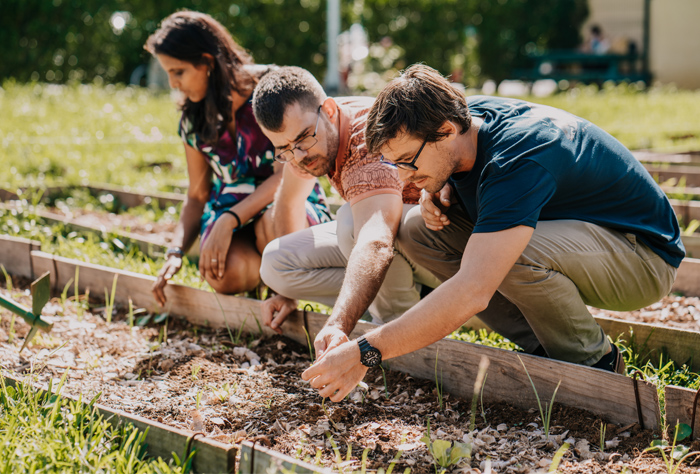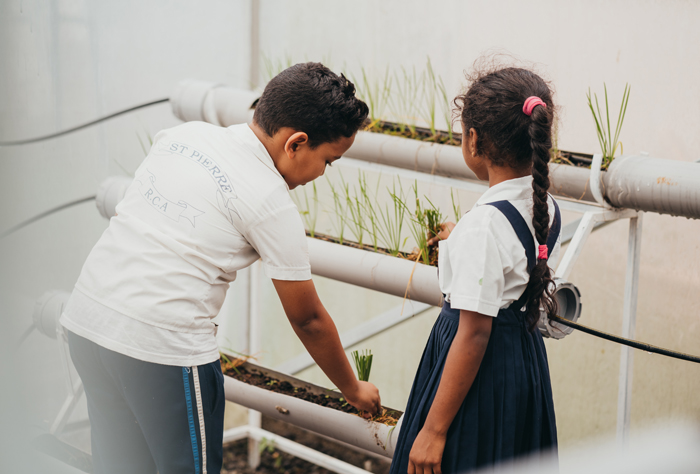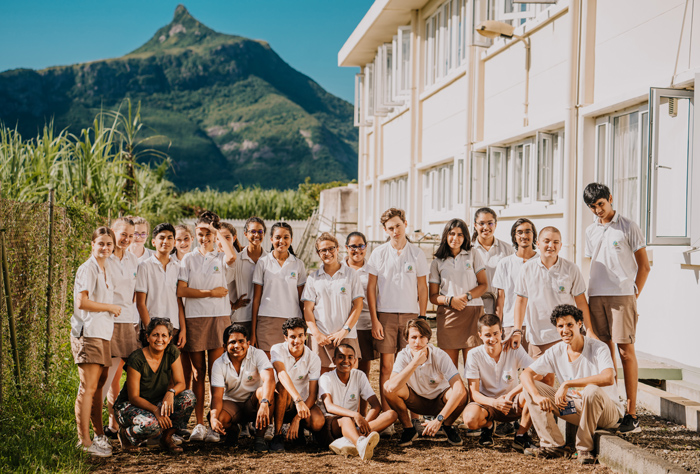Waste sorting and recycling, vegetable and medicinal gardens, awareness-raising activities… Schools in the region of Moka and Saint Pierre are integrating ecology and sustainable development at the heart of their curriculum, Ecological projects are blooming at École du Centre, St Pierre RCA and Lycée des Mascareignes.
The vegetable garden as an educational tool
At Lycée des Mascareignes (LDM), an organic vegetable garden was set up at the beginning of the year following a workshop where a group of ten teachers and school staff have participated. Animated by Aurore Rouzzi from Sensibio – a company providing training sessions on organic farming – this workshop has allowed the participants to learn about permaculture and how to develop a vegetable garden. Their vegetable garden covers a space of over 40 square meters and will evolve to reach 100 square meters. The compost used as a natural fertiliser in the garden, is derived from the students’ waste as well as the mulching of grass and the crushed branches from the yard of the establishment.

The objective is to integrate a vegetable garden in the school and use it as an educational tool. “There are several practical applications available for different sectors. Scientists will be able to carry out a physico-chemical analysis of the soil while the students studying Management, will be able to work on the Sale and Communication aspects of the vegetables produced,” explains Physics teacher Frédéric Lagourgue. In addition, the school collaborates with the collective Moka’mwad so that the vegetable garden is accessible to the inhabitants of the region as part of a pedagogical project.
Back to the land

St Pierre RCA, a certified Eco-School, is an unconventional establishment. The school has a medicinal garden, an area for endemic trees, a greenhouse nursery and an organic vegetable garden where vegetables grow in containers. The projects involve students from different classes. Once a week, they weed and sow seeds in the nursery. To implement these projects, the school has benefited from the help of many organisations, including Indian Ocean Commission, Mouvement pour l’Autosuffisance Alimentaire and Le Vélo Vert.
“We have an ecological committee that decides on the allocation of the projects to each class for the year,” explains Assistant School Teacher, Rosabi Boodoo. It is a new way of learning for the students. Through these projects, students are discovering various farming techniques, such as vertical cultivation using the school’s wall.
Plastic: reduction and recycling
Being aware of the damage caused by plastic on our ecosystem, the students now understand the importance of waste sorting. At St Pierre RCA, each class has two bins: one for paper and another for other types of waste. In the yard, a bin for plastic bottles is emptied regularly by the NGO Mission Verte, while peels and other organic waste are used for composting.
At LDM and École du Centre, other ecological measures have been undertaken to reduce the use of plastic, such as installing water fountains that allow students to refill their water bottles. At the school canteen, plastic cutlery and polystyrene boxes are no longer in used. Students now bring their own reusable containers.
Raising awareness and mobilisation
At LDM, an Environment Club was created last year. ” Our goal is to change things across the school,” said Manon Lacmant, spokesperson of the club. With a group of thirty members, this club organises various initiatives to raise awareness among students and collaborates on a few activities with the students of Lycée La Bourdonnais.
In November 2018, a joint cleaning operation in the area of Mare aux Vacoas, as part of ‘Semaine des lycées français du monde’(The week of French high schools in the world), was organised. During that month, a mural was painted on the school’s wall, where all students had put their hand prints. This initiative by Joana and Alizée, two students in their last year, was aimed at educating their friends on the protection of the marine ecosystems. “Sustainable development has become an important topic to talk about, whether in school or at home,” says Alizée Avrillon.
Student Engagement
At École du Centre, the Environment Club has recently been created. On the 11th of March, students from different classes made a list of past initiatives implemented in their school and reflected on the projects to be undertaken around three axes: healthy eating, biodiversity and waste sorting. “A committee gathering teachers, students and parents of the school, has been set up,” says Mathematics Teacher Florence Dumée-Duval.

In April, the vegetable garden of the establishment will be set up. In March, a group of Grade 3 students participated in the Climate Walk in the streets of Port Louis. Meanwhile the English department has conducted several initiatives, as part of a project on the flora and fauna of Mauritius. The students visited the Ebony Forest Reserve in Chamarel and has also welcomed Vincent Florens, Biodiversity Professor at the University of Mauritius, who explained the fragility of the ecosystems. The aim of this project is to create a garden of endemic plants.
“Be the change you want to see in the world,” said Gandhi. These schools have understood this well and are arming the next generations with the required tools and know-how to face the climate challenges that lie ahead.
